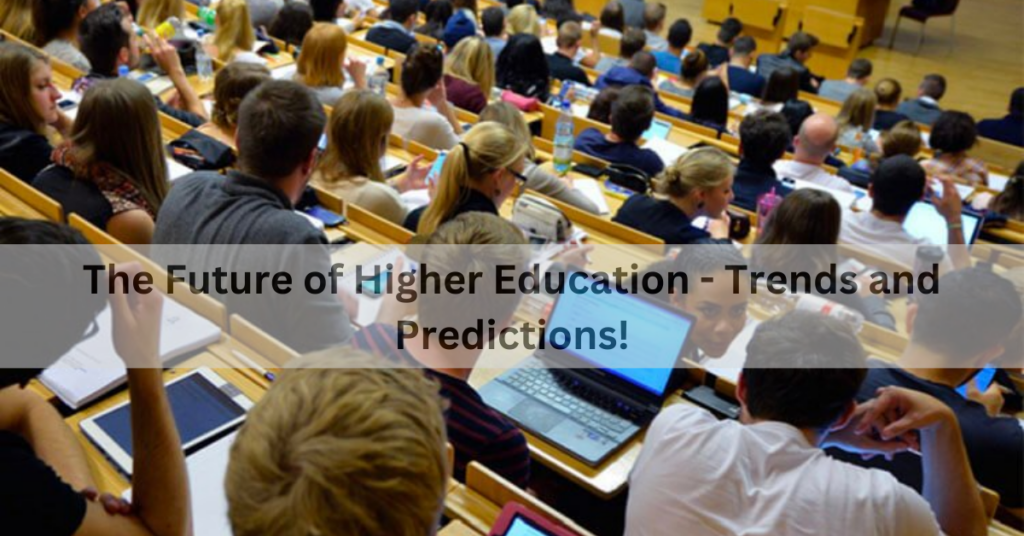Higher education is undergoing a significant transformation driven by technological advancements, changing student needs, and evolving job market demands. This article explores the key trends shaping the future of higher education and provides predictions on how institutions will adapt to meet these challenges. From the rise of online learning to the emphasis on lifelong education, discover how higher education is evolving to better prepare students for the future.
The Rise of Online and Hybrid Learning
Online and hybrid learning have gained significant traction, accelerated by the COVID-19 pandemic. These flexible learning models offer students the convenience of accessing courses from anywhere, accommodating diverse schedules and learning preferences. Universities are investing in robust online platforms, developing interactive content, and utilizing digital tools to enhance the learning experience. The future will see a blend of traditional classroom instruction with online components, providing a more personalized and accessible education for students worldwide.
Personalized Learning and Adaptive Technology
Personalized learning tailors educational experiences to individual student needs, preferences, and learning paces. Adaptive learning technologies, powered by artificial intelligence (AI), analyze student performance data to customize content and provide targeted feedback. This approach helps identify knowledge gaps, reinforce concepts, and enhance student engagement. Institutions are increasingly adopting AI-driven platforms that offer personalized pathways, ensuring students receive the support they need to succeed. The future of higher education will see widespread integration of these technologies, making learning more efficient and effective.
Emphasis on Lifelong Learning
The rapid pace of technological change and evolving job market demands necessitate continuous skill development. Higher education institutions are recognizing the importance of lifelong learning and are offering more flexible, modular courses that cater to working professionals. Micro-credentials, certificates, and short-term programs allow individuals to upskill or reskill without committing to lengthy degree programs. This shift towards lifelong learning ensures that education remains relevant and accessible throughout an individual’s career, fostering a culture of continuous improvement and adaptability.
Competency-Based Education
Competency-based education (CBE) focuses on students demonstrating mastery of specific skills and knowledge rather than completing a set number of credit hours. This model allows for a more personalized pace of learning, enabling students to progress as they master each competency. CBE programs are particularly beneficial for adult learners and those with prior work experience, as they can leverage their existing skills to advance more quickly. The future will see an increase in CBE offerings, providing flexible pathways for students to achieve their educational and career goals.
Globalization and International Collaboration
Higher education is becoming increasingly globalized, with institutions forming international partnerships and offering cross-border programs. Collaborative research, student exchange programs, and joint degree offerings provide students with diverse perspectives and global experiences. This trend enhances cultural understanding, fosters innovation, and prepares students for a globalized workforce. As technology continues to bridge geographical gaps, the future of higher education will see even more robust international collaboration, creating a more interconnected and inclusive academic community.
Focus on Soft Skills and Emotional Intelligence
Employers are placing greater emphasis on soft skills, such as communication, teamwork, and problem-solving, alongside technical expertise. Higher education institutions are integrating soft skills training into their curricula to better prepare students for the workforce. Programs focusing on emotional intelligence, leadership development, and interpersonal skills are becoming more prevalent. The future will see a balanced approach to education, combining technical knowledge with essential soft skills, ensuring graduates are well-rounded and adaptable professionals.
Integration of Emerging Technologies
Emerging technologies, such as virtual reality (VR), augmented reality (AR), and blockchain, are being integrated into higher education to enhance learning experiences and administrative processes. VR and AR provide immersive, hands-on learning opportunities, particularly in fields like medicine, engineering, and the arts. Blockchain technology offers secure and transparent credentialing, streamlining the verification of academic records. As these technologies continue to evolve, higher education institutions will adopt innovative solutions to improve teaching, learning, and administrative efficiency.
Sustainable and Inclusive Education
Sustainability and inclusivity are becoming central themes in higher education. Institutions are prioritizing eco-friendly practices, reducing their carbon footprint, and incorporating sustainability into their curricula. Inclusive education initiatives focus on providing equal access to education for all students, regardless of background, socioeconomic status, or abilities. Efforts to create supportive and diverse learning environments are driving policy changes and resource allocation. The future of higher education will see a stronger commitment to sustainability and inclusivity, fostering a more equitable and responsible academic community.
Conclusion
The future of higher education is marked by significant advancements and shifts, driven by technology, changing student needs, and global challenges. Online and hybrid learning, personalized education, and lifelong learning are transforming the traditional education model. Emphasizing soft skills, integrating emerging technologies, and fostering global collaboration are essential for preparing students for the future workforce. By prioritizing sustainability and inclusivity, higher education institutions can create a more equitable and responsible learning environment. Embracing these trends and innovations ensures that higher education remains relevant, accessible, and impactful in an ever-evolving world.

















